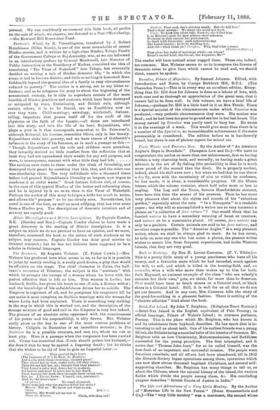Fortune's Wheel, by K. Viresaliugman, translated by J. Robert Hutchinson
(Elliot Stock), is one of the most remarkable of recent Hindoo stories, and is written by a high-class Hind(); Telega Pundit of the Government College at Raj ahmandry, who, as we are informed in an introductory preface by General Macdonald, late Director of Public Instruction in the Presidency of Madras, conceived the idea of translating "The Vicar of Wakefield" into Telegu, but eventually decided on writing a tale of Hindoo domestic life, " in which the some is laid in his own district, and little or nothing is borrowed from Goldsmith beyond the general idea of a family in easy circumstances reduced to poverty." The author is a strong, not to say bitter re- former ; and as he relegates his story to about the beginning of the seventeenth century, he is able to reproduce certain of the more horrible of Medea practices and customs, which have been destroyed or mitigated by time, Christianity, and British rule, although certain others, it is to be feared, are as fburishing now as ever they were. Child-marriage, astrology, witchcraft, fortune- telling, imposture that passes itself off for the craft of the physician or the faith of the fanatic,—all these are introduced into this story, and into the life of its hero, Rajasekhara, who plays a part in it that corresponds somewhat to Dr. Prim rose's, although Rukmini, his heroine, resembles Olivia only in her beauty. Rajasekhara sinks into poverty, and we have traces of Goldsmith's influence in the story of his fortunes, as in each a passage as this :— "Though Rajasekhara and his wife and children were penniless, they inwardly derived no little comfort from the reflection that at least they had not squandered their wealth for any evil purpose, and were, in consequence, content with what little they had left The envious ones came to them under the cloak of friendship, and destroyed their peace by asserting that this, that, and the other one was slandering them. The very individuals who a thousand times before had praised Rajasekhara's liberality as largess, now began to condemn it as sinful waste." Good fortune follows evil, of course, in the case of this typical Hindoo of the better and reforming class, and he is injured by it no more than is the Vicar of Wakefield. Perhaps the author of this story indulges a trifle too much in satire, and allows his " purpose " to be too clearly seen. Nevertheless, his novel is one of the best, as well as most edifying, that has ever come from a Hindoo pen. The descriptions of domestic interiors and of scenery are equally good.


































 Previous page
Previous page